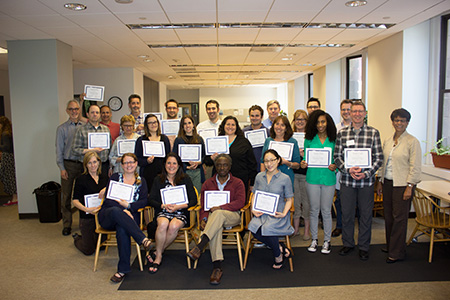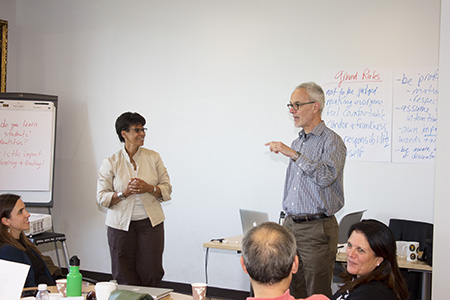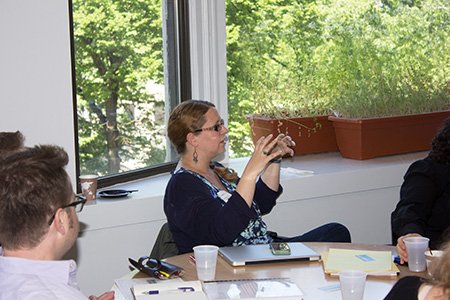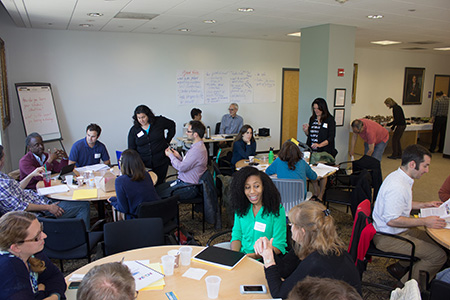Faculty diversity workshop attendance doubles

Twenty-two of the 45 faculty members who completed two sessions of the Inclusive Excellence Faculty Fellows Program are pictured here in the Iwasaki Library after completing the second session of the course in June.
The number of Emerson faculty members who participated in the annual inclusive pedagogy workshop, called the Inclusive Excellence Faculty Fellows Program, increased significantly this year.
Forty-five faculty members participated in two sessions of this year’s Faculty Fellows Program, compared to 19 last year and in 2013, when the three-day fellowship began.
“We help the faculty look at themselves in relation to diversity and inclusion, and what they’re doing in the classroom about it,” said Robert Amelio, director of diversity and inclusive excellence, who co-facilitated the course.
The Faculty Fellows Program was originally developed by Sylvia Spears, vice president for diversity and inclusion, in collaboration with Lori Beth Way, senior advisor for undergraduate education.
This year, the Office of Diversity and Inclusion offered a second session of the Faculty Fellows Program to accommodate the increased demand. Even with the second session, the office was unable to accommodate all faculty who applied to the program.
“It’s very encouraging to see the faculty taking a hard look at what diversity and inclusion mean in a classroom setting,” Spears said. “We hope the Faculty Fellows Program provides them with additional instructional tools and insights into the ways they can ensure their classes are inclusive spaces—spaces in which students can thrive.”

Sylvia Spears and Robert Amelio of the Office of Diversity and Inclusion co-facilitated the Inclusive Excellence Faculty Fellows Program.
Amelio said that faculty examined a range of topics and issues, which included the impact of microaggressions on classroom climate, how to facilitate difficult dialogues, developing assignments to address the diverse learning styles of students, and how to create a safe classroom.
“A microaggression is the seemingly small but constant occurrence of repeated slights or insults, or intrusions on a personal level,” Amelio said. “An example that is very common is an African American student being asked to represent the perspectives of their entire race in the context of a classroom discussion.”
Eric Weiss, a faculty member and admissions coordinator for the Performing Arts Department, completed the program in 2013.
“Any training that asks you to consider the perspectives of all students is a good thing,” Weiss said. “The fellowship made me consider how I used language, and what kinds of messages it sends to students. Saying something like ‘first-year student’ instead of ‘freshmen’ is good because it’s not gender specific, for example.”

Johnette Ellis, a faculty member in the Writing, Literature and Publishing Department, recently completed the Fellows Program, and said her students often read evocative texts in which race, gender, and sexuality become core to the class discussions.
“I feel it is my responsibility as an instructor to work with comfort and discomfort in the classroom very strategically,” Ellis said. “It is hard work and worthwhile.”
Ellis plans to create a personal log after each lesson she teaches in order to reflect on how well she coordinated discussions, among other ideas.
“The Inclusive Excellence Faculty Fellows Program is designed to help faculty make diversity and inclusion real as opposed to a concept,” Amelio said.

Numerous faculty attend the Inclusive Excellence Faculty Fellows Program in the Iwasaki Library in June.
Thomas Vogel, associate professor and graduate director of Global Marketing Communication and Advertising, said the fellowship was “an amazing experience.”
“I feel much more empowered,” he said. “I’ve learned it’s impossible to be completely unbiased, but my sensitivity has been heightened.”
Vogel works with a large number of international graduate students. He said he learned skills to avoid singling out students with different cultural backgrounds, and to be more accommodating to students from different backgrounds who may work differently.
“People might be operating from different value systems,” he said. “I’m always thinking of my students and trying to put myself in their shoes.”
List of This Year’s Participating Faculty Members:
Jane Akiba
Joseph Antoun
Emily Avery-Miller
“Mary” Morgan Baker
Claude Bartholomew
Lindsey Beck
Joanne Ciccarello
Leslie Cormier
Cathryn Cushner Edelstein
Kathleen Donohue
Timothy Edgar
David Emblidge
Johnette Marie Ellis
Kelly Farquharson
Robin Fast
L. Marc Fields
Karla Fribley
Mneesha Gellman
Jennifer Gordon
Randy Harrison
Ted Hewlett
Judith Hull
Whitney James
Katherine Kim
Cristina Kotz Cornejo
Jamie Lichtenstein
Heather May
Caitlin McGill
Roberto Mighty
Amissa Miller
Kevin Miller
Yasser Munif
Russell Newman
Matthew Noferi
Nneka Nwosu Faison
William Palumbo
Nejem Raheem
Madga Romanska
Anna Ross
Robrecht Thoonen
Thomas Vogel
Wendy Walters
Erika Williams
Brenda Wrigley
Categories